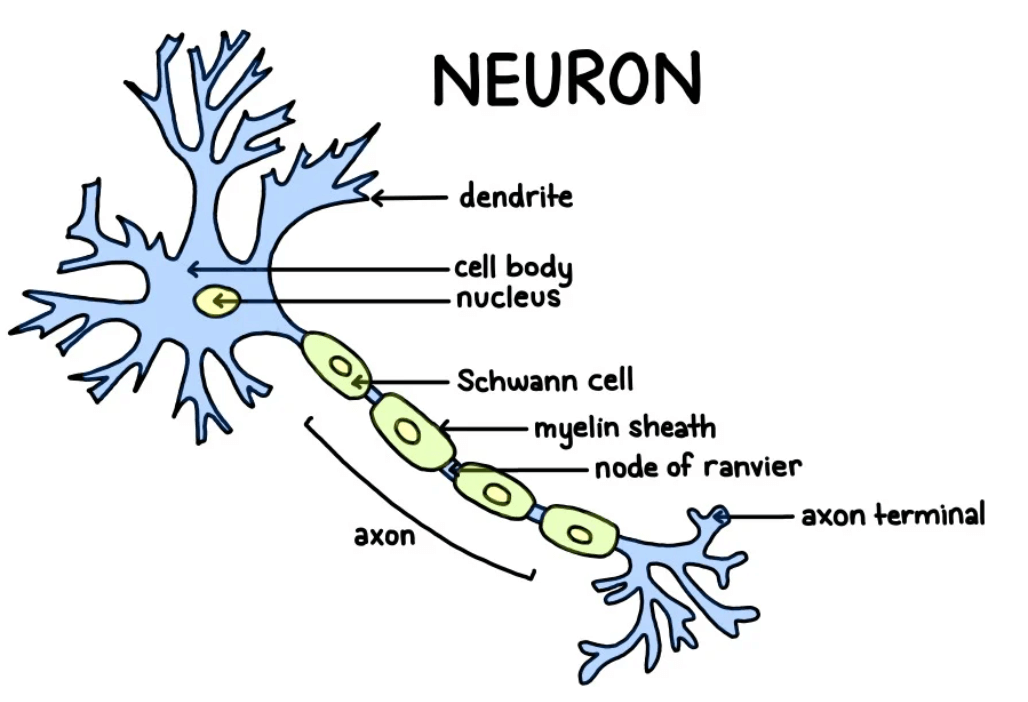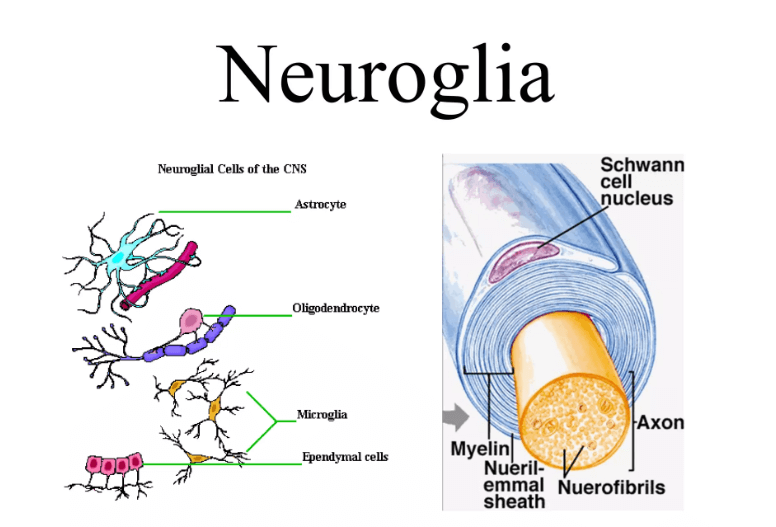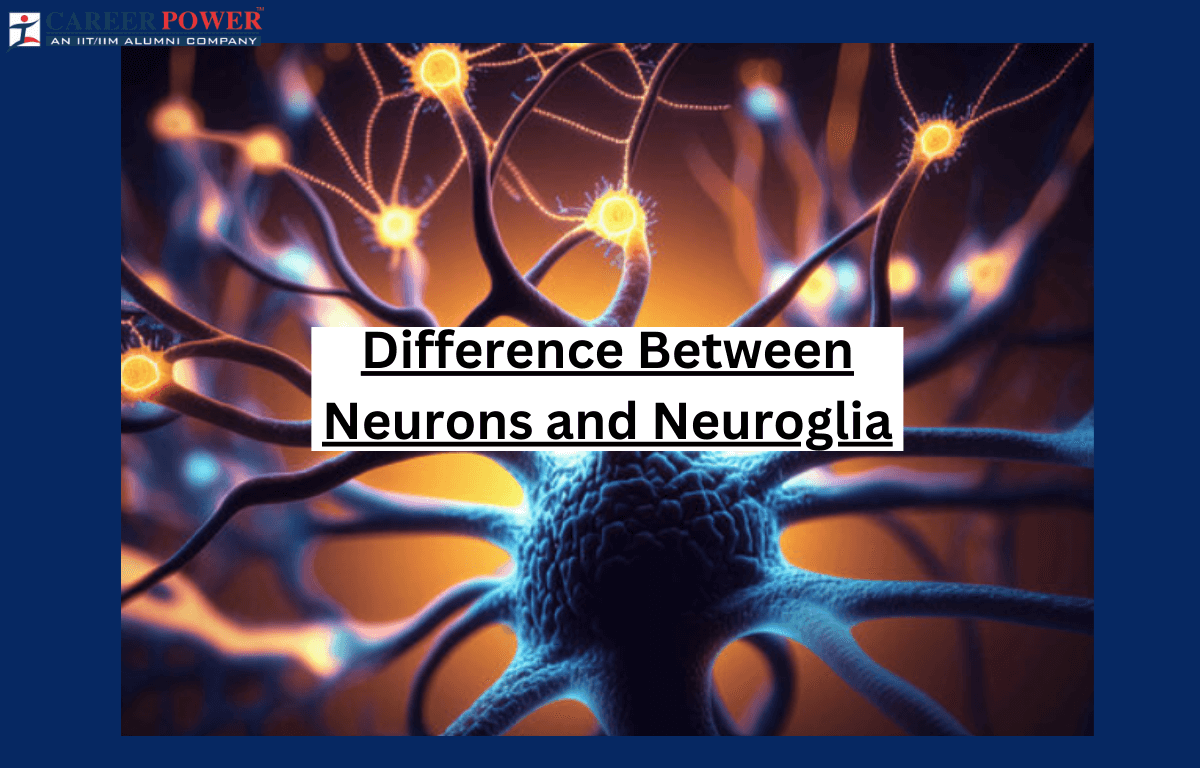Neurons and Neuroglia
Neurons are the primary cells responsible for transmitting signals in the nervous system, while neuroglia (or glial cells) provide support, insulation, and nourishment to neurons. Neurons generate electrical impulses for communication, whereas neuroglia plays a crucial role in maintaining the structural and functional integrity of the nervous system. The other important information related to the Neurons and Neuroglia such as their difference and importance are discussed below.
Define Neurons
A neuron is a fundamental building block of the nervous system, serving as a specialized cell that transmits information in the form of electrical and chemical signals. Think of it as a tiny messenger within your brain and nerves. Neurons have three main parts: dendrites, a cell body, and an axon. Dendrites receive signals from other neurons, like branches collecting information. The cell body processes these signals, deciding whether to send a message or not.

If the decision is affirmative, the axon, a long tail-like extension, carries the message to other neurons or muscles. Communication between neurons occurs through synapses, small gaps where chemicals called neurotransmitters transmit signals. Imagine a neuron as a messenger passing notes to other messengers, contributing to the intricate network that enables thoughts, memories, and the functioning of our entire nervous system.
Define Neuroglia
Neuroglia, also known as glial cells, are a vital component of the nervous system, working alongside neurons to support their functions. Unlike neurons, neuroglia doesn’t transmit electrical impulses; instead, they provide essential support and protection. Glial cells come in various types, each with specific roles. Astrocytes, for example, help regulate the chemical environment around neurons, while oligodendrocytes and Schwann cells produce myelin, a fatty substance that insulates nerve fibers, facilitating faster transmission of signals.

Microglia act as the immune system of the nervous system, defending against pathogens and cleaning up debris. Ependymal cells line and spinal cord, contributing to cerebrospinal fluid production. Together, neurons and neuroglia form a complex and dynamic network that ensures the dynamic network that ensures proper functioning and well-being of the nervous system. Neuroglia plays crucial roles in maintaining the structural integrity of neural tissues, supporting neuronal function, and participating in the immune responses of the central nervous system.
Difference Between Neuron and Neuroglia
Below we have discussed a few points that will highlight the difference between neuron and neuroglia.
| Difference Between Neuron and Neuroglia | ||
| Features | Neuron | Neuroglia |
| Functions | The main function of neurons is to transmit signals. | The main function of neuroglia is to support and protect neurons. |
| Structure | The structure of neurons has a cell body, axon, and dendrites. | Neuroglia has various types, such as astrocytes, oligodendrocytes, and microglia, each with distinct structures. |
| Number | Neurons are relatively fewer in number. | Neuroglia outnumber neurons and are more abundant. |
| Conductivity | Neurons conduct electrical impulses. | Neuroglia do not generate electrical impulses but modulate the chemical environment. |
| Communication | Neurons communicate via synapses and neurotransmitters. | Neuroglia do not transmit signals in the same way but contribute to the overall environment. |
| Longevity | Neurons are long-lived and can last a lifetime. | Neuroglia can undergo regeneration and have varying lifespans. |
| Movement | Neurons can send signals over long distances. | Neuroglia typically has limited mobility. |
| Role in Diseases | Neurons are directly implicated in many neurological disorders. | Dysfunction of the neuroglia can contribute to neurological diseases. |
| Myelination | Neurons may or may not be myelinated. | Certain types of neuroglia, like oligodendrocytes in the central nervous system, are responsible for myelination. |
| Metabolic Support | Neurons rely on neuroglia for metabolic support and waste removal. | Neuroglia contributes to the maintenance of the chemical environment necessary for neuronal function. |
Importance of Neurons and Neuroglia
Neurons and Neuroglia are crucial components of the nervous system. Neurons transmit electrical signals, enabling communication within the brain and between the brain and other parts of the body. Neuroglia, or glial cells, support and protect neurons, contributing to overall brain function. Together, they play a fundamental role in cognitive processes, sensory perception, and maintaining the body’s homeostasis.
Importance of Neuron
- Neurons transmit electrical signals in the nervous system.
- The neurons facilitate communication within the brain and throughout the body.
- Neurons play a vital role in cognitive functions, including thinking and memory.
- The neurons are essential for sensory perception and motor control.
Importance of Neuroglia
- The neuroglia supports and protects neurons.
- The neuroglia maintains the structural integrity of the nervous system.
- Neuroglia provide nutrients to neurons and regulate their chemical environment.
- The neuroglia contributes to the immune defense of the brain.
- They assist in the repair of neural tissue after injury.



 50 Vegetables Name for Kids in English a...
50 Vegetables Name for Kids in English a...
 Food Chain: Definition, Types, Examples,...
Food Chain: Definition, Types, Examples,...
 Human Respiratory System: Definition, Di...
Human Respiratory System: Definition, Di...













